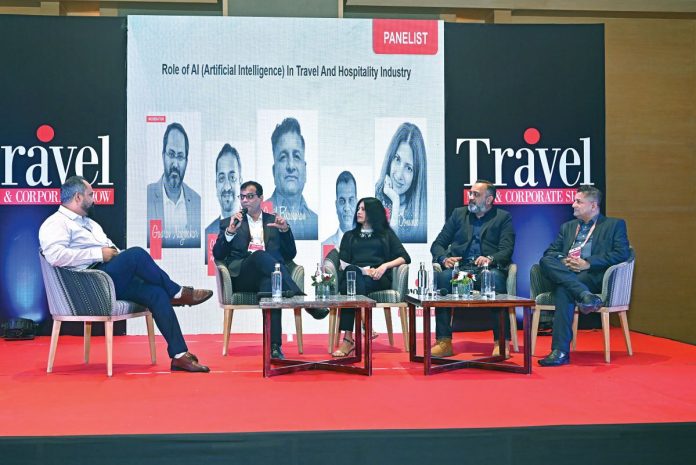Artificial intelligence (AI) is not just a buzzword anymore. It is the need of the hour as corporate travel leaders believe it will enhance the ease of doing business…
By Janice Alyosius
Artificial intelligence (AI) is transforming corporate travel, enhancing efficiency, personalisation, and decision-making. Corporate leaders during 11th Travel MICE and Corporate Show at Hyatt Regency Lucknow, explored its potential, covering topics from optimising bookings and safety to predictive analysis. While challenges such as cost, security, and adoption remain, AI’s ability to streamline processes is undeniable, paving the way for a smarter future in business travel.
During his keynote address, Rajdev Bhattacharya, Global Head, Travel & Expenses, Wipro, emphasised the increasing reliance on technology and its challenges. He questioned whether the current skill sets are sufficient or adaption as per change is essential. He stated, “AI is the horse, and we must be the rider.”
Bhattacharya pointed out that modern corporate travel strategies are being reshaped by four major factors: economic pressures requiring ROI-driven travel, shifting consumer behaviours favouring digital services, sustainability becoming a business necessity rather than an option, and the rise of AI-powered automation. He underlined that the real differentiator for travel professionals will be their ability to provide a human touch—offering empathy, problem-solving, and adaptability in an AI-driven world.
Integral to business
Ankush Bindra, Category Lead, Mobility Services, Siemens, raised a crucial point about evaluating the positive impact of AI, “First, you need to measure the impact-whether it is positive or negative, and to what extent. For AI to truly make a difference, adoption is key. If adoption rates are low, the benefits of AI become negligible. However, with higher adoption rates, such as 90 per cent in domestic Online Booking Tools (OBTs), we see AI adding value by sensing trends, optimising flight and hotel selection, and offering flexible options like adjusting dates.”
Asserting, “AI is going to be a part of our lives, whether we like it or not,” Shashi Kiran Parameshwaran, Global Front Office Lead, Travel & Expense, ABB, underlined the inevitability of AI in travel. “The focus should be on figuring out how to make it work for us. It is about enhancing processes, meeting needs, and maximising its potential.”
Predictive analysis
Pointing out how AI is impacting expense tracking and itinerary building, Bindu Dominic, Principal Global Travel, Meetings and Events, Haleon, highlighted the efficiencies of AI. He said, “Many Travel Management Companies (TMCs) are testing virtual agents, replacing human voices with AI. This integration leads to cost savings, predictive analysis, and improved trend forecasting. It aids in areas such as duty of care and safety measures.”
Online vs offline dynamics
Explaining the varying impacts of AI depending on adoption models, Sunil Bhaskaran Menon, Global Category Manager, Travel and Fleet, Otis Global Services Center, highlighted, “In the U.S. and Europe, where 90 per cent of travel bookings are online, AI enhances the experience through chatbots and automated solutions. Conversely, markets such as the Middle East, Africa, and parts of Asia Pacific, which rely more on offline processes, are yet to experience the full benefit.” As AI transforms corporate travel, the question remains – Are traditional TMCs equipped to adapt? Menon highlighted the rise of TMCs that are embracing technology rather than sticking to traditional methods, “There are TMCs in the market that are more technology driven. They have integrated AI into their online booking tools, including chatbots enhancing the experience.
He added, “Apart from personalisation, these tools provide live data dashboards and enable data analytics to optimise travel programmes. If the bookings are not aligned with set objectives, the programme can be adjusted accordingly in real-time.”
However, Menon also pointed out the challenges for offline-driven TMCs, “If we look at an Indian company that operates offline, the impact of AI will be there, but it will be less compared to an online-driven model.” As per him, the key takeaway is to transition to online platforms, as that is where AI can have the most impact. The message is clear: adapt to technology or risk being left behind in a rapidly evolving landscape.
Menon’s perspective makes it apparent that while AI is being hailed as a transformative force in the corporate travel industry, the stakeholders are yet not fully aware which adoption model will truly benefit their business.
Dependence on AI
Parameshwaran addressed one of the primary concerns with AI adoption i.e. data security. He said, “There is a lot of concern about the level of security AI provides and how much we can rely on it. People want everything at their fingertips, but they are also wary of the costs involved and the security risks. It is essential to have a clear understanding of your requirements and conduct realistic checks before diving into AI.” He also pointed out the importance of defining clear objectives for AI adoption, particularly in areas such as employee compliance and fraud detection, where AI can offer significant advantages.
Cost challenges
Taking the discussion towards the barriers faced by many organisations in implementing AI, Ajay Bhatt, Group Head, Corporate Services, Godrej, added another layer to the conversation. He said, “The cost of implementing AI technologies is still quite high, which is a significant challenge for many organisations. While some companies, particularly those with fewer financial constraints, have successfully adopted AI, for others, investment is too steep.”
He further noted the complexity of adoption, explaining that while some organisations are using technology in their travel operations, they are not yet fully utilising AI. According to Bhatt, full integration could take a few more years, particularly with the advent of Gen Z and Gen Alpha, who will have different expectations for travel arrangements. Their needs will surely evolve and will impact its adoption with the evolving times.
Risk and implementation
Highlighting the risk factor in AI adoption, Bindra pointed out, “AI is on many wish lists, but the question is whether companies are ready to take the leap. Are they willing to implement AI in a phased manner or go all-in? The market has limited partners offering such advanced solutions, which makes the decision even more challenging. Still, we are witnessing companies implement AI in their booking tools, with predictive features and helpful chatbots already in the market.”
Measuring ROI
Dominic underlined another significant challenge, determining the Return on Investment (ROI) for AI, “The biggest hesitation for many businesses is understanding the ROI. We have not reached the point where we can measure the impact. It is essential to define what success looks like and how we can quantify the value that AI brings to the table for customers and stakeholders.”
While there is enthusiasm for AI in corporate travel, there are still significant gaps in readiness. Dominic shared, “I think some of us are ready, and some are uncertain, but I would not say they are not ready.” Dominic emphasised that increasing awareness and providing education is crucial to overcome hesitation. “The more awareness you bring, the more education you can do, and the more sessions like this can bring people together to discuss, and will make people ready for adoption,” she added. She drew a parallel with long-discussed topics such as sustainability and New Distribution Capability (NDC), where early skepticism has been replaced by growing interest and serious questions about how these technologies can be effectively implemented in the industry.
The discussion underscored that educating the industry stakeholders on AI can influence the hesitation related to its adoption in the coming years and in overcoming hurdles. In addition to that, businesses must carefully evaluate their needs and capabilities before diving in. They should increase awareness on data security and evaluate their ROI in detail as the journey towards AI-driven corporate travel is one of gradual progress, with companies needing to balance innovation with caution.
Collaborative approach
For AI to reach its full potential, Devendra Saraiya, Head-Procurement and Travel, Deloitte stressed the importance of collaboration between travel buyers and suppliers. “We need to ensure that our suppliers are equally equipped and consult us during the development of technology, so that we can create something that travellers can truly use,” he said. With travellers already accustomed to using AI in their personal lives, Saraiya sees no reason why they would not adopt it in the corporate travel space as long as it is user-friendly.
Overcoming challenges
Both Dominic and Saraiya highlighted scalability and ROI as critical issues in the successful adoption of AI solutions. “When DMCs are able to build a scalable model, ROI will still be an issue,” Saraiya pointed out. For AI to gain widespread acceptance, it needs to deliver clear value while being efficient and cost-effective. Without these factors in place, the potential of AI in corporate travel will remain unrealised.
As the industry looks ahead, it is clear that while AI may have its influences but cost and ROI will remain paramount in deciding whether to adopt it or not. If these concerns are addressed timely during various phases of its implementation, the corporate travel industry can successfully navigate the path to AI adoption, unlocking new opportunities for efficiency, personalisation, and innovation.
AI for a better future
As AI rapidly evolves, its potential to transform corporate travel is undeniable. When asked about the future of AI, Parameshwaran emphasised its inevitability. He said, “It is going to significantly change our lives in the next five years, so it is better to accept it, embrace it, and learn about it.” However, he cautioned against over-reliance, citing examples such as the misuse of AI tools such as ChatGPT. “People use it to avoid thinking; they just copy-paste answers without reading them,” he noted, urging a balanced approach. “We need to see how we can embrace it, use it to our advantage, and take the best out of it while staying informed and confident,” he added. It should be used to enhance the efficiency of the process.
Role of service providers
Menon highlighted the crucial role service providers play in embedding AI into travel technologies, such as online booking tools. He underscored the importance of adopting AI-driven insights for data analytics and policy adjustments, urging service providers and corporates to move forward collaboratively for better results. He further stressed that AI adoption must align with corporate objectives while focusing on traveller satisfaction and changing preferences.
Proactive approaches
Moreover, the pace of change in technology adoption was addressed by Bindra. “We are talking about five years, but with the speed of execution required for analytics and compliance, it might happen much sooner,” he said. He encouraged organisations to act quickly, warning against delays in implementing AI solutions. Similarly, Dr. Sanjay Pai, Vice President, Facilities, Corporate Travel, Hospitality & Director Aviation, Larsen & Toubro, emphasised the need for balance in leveraging AI. “AI offers a proactive approach, filling gaps before damage is done,” he said, adding, “Without proper understanding, AI’s potential can be underutilised.”
Three Cs
Summing up the benefits, Dominic reflected on how AI can address key priorities for corporate travel managers. “In five years, it will help achieve the three Cs-cost, control, and convenience,” she stated.
The consensus among panelists was clear, AI will surely impact corporate travel by enhancing efficiency and delivering data insights. However, its success will depend on a collective effort of the sector and collaboration between service providers and corporates. As Parameshwaran aptly concluded, “There is no running away from AI-it is about how well we adapt and use it to our advantage.”
“Real differentiator for travel professionals will be the ability to provide human touch—offering empathy and problem-solving in AI-driven world.” – Rajdev Bhattacharya, Global Head, Travel & Expenses, Wipro
While AI is being hailed as a transformative force in the corporate travel industry, the stakeholders are yet not fully aware which adoption model will truly benefit their business
While AI offers immense potential to transform corporate travel, the journey towards its adoption is one of gradual progress, with companies needing to balance innovation with caution
AI adoption must align with corporate objectives while focusing on traveller satisfaction and preferences















